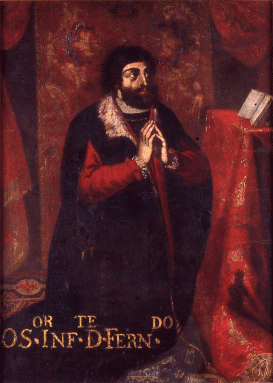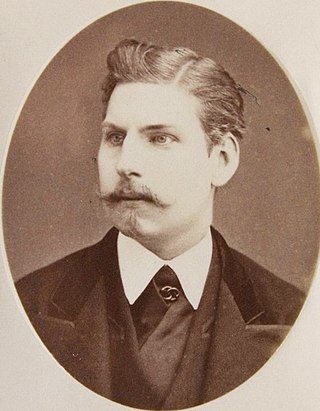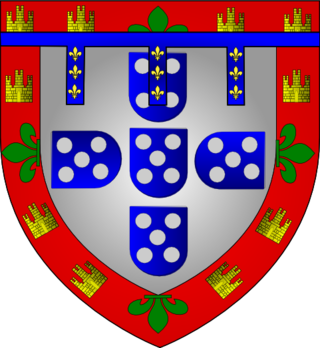

Duke of Beja (Portuguese : Duque de Beja) was an aristocratic Portuguese title and royal dukedom, associated with the Portuguese Royal House.


Duke of Beja (Portuguese : Duque de Beja) was an aristocratic Portuguese title and royal dukedom, associated with the Portuguese Royal House.

The Most Serene House of Braganza, also known as the Brigantine dynasty, is a dynasty of emperors, kings, princes, and dukes of Portuguese origin which reigned in Europe and the Americas.
Prince of Beira is a title traditionally granted to the heir apparent to the throne of Portugal. The title's original use that it be granted on the eldest daughter of the reigning monarch of Portugal. Tied with the title of Prince of Beira, is Duke of Barcelos, as heir to the Duke of Braganza and Prince of Brazil. The title's name has its origins in the Beira province in central Portugal.
John of Portugal is the name of several Portuguese kings and other members of the Portuguese Royal Family:

Infante Ferdinand, Duke of Viseu and Beja was the third son of Edward, King of Portugal and his wife Eleanor of Aragon.

Infante Luís of Portugal, Duke of Beja was the second son of King Manuel I of Portugal and his second wife, Maria of Aragon. He participated in the Conquest of Tunis.

Infante Francisco, Duke of Beja was a Portuguese infante (prince) son of Peter II, King of Portugal, and his second wife, Maria Sofia of the Palatinate.

Infante João, Duke of Beja was a Portuguese infante (prince) and member of the House of Braganza.

Infante Augusto, Duke of Coimbra was a Portuguese infante (prince) of the House of Braganza.

The Military Order of Saint James of the Sword is a Portuguese order of chivalry. Its full name is the Ancient, Most Noble and Enlightened Military Order of Saint James of the Sword, of the Scientific, Literary and Artistic Merit.
Constable of Portugal was an office created by King Ferdinand I of Portugal in 1382, to substitute the High Standard-bearer (Alferes-Mor) as the head of the Portuguese Military. It was also referred as the Constable of the Kingdom.

Duke of Viseu was a Portuguese Royal Dukedom created in 1415 by King John I of Portugal for his third male child, Henry the Navigator, following the conquest of Ceuta.

Infanta Beatriz of Portugal was a Portuguese infanta, daughter of John, Constable of Portugal, and Isabella of Barcelos, a daughter of Afonso I, Duke of Braganza.

Duke of Coimbra was an aristocratic Portuguese title with the level of royal dukedom, that is, associated with the Portuguese royal house, created in 1415, by King John I of Portugal to his 2nd male son, Infante Pedro. Pedro was regent of the kingdom but he was killed in the domestic Battle of Alfarrobeira (1449).

Isabel of Viseu (1459–1521) was a daughter of Infante Fernando, Duke of Viseu and his wife and cousin Infanta Beatrice, Duchess of Viseu. She was a member of the House of Aviz and later, House of Braganza.

Infante João of Viseu was the older son of Infante Fernando, Duke of Viseu and of his wife Infanta Beatrice of Portugal.

Infante Diogo of Viseu (1450–1484) was the second son of Ferdinand, Duke of Viseu, and his wife Beatriz, Duchess of Viseu.
The Prior of Crato, was the traditional title given to the head of the Order of the Knights of St. John of Jerusalem (Hospitaller) in Portugal. It is a reference to the domains of the order around Crato, Portugal.

The Pantheon of the House of Braganza, also known as the Pantheon of the Braganzas, is the final resting place for many of the members of the House of Braganza, located in the Monastery of São Vicente de Fora in the Alfama district of Lisbon, Portugal. The pantheon's burials have included Portuguese monarchs, Brazilian monarchs, a Romanian monarch, queen consorts of Portugal, and notable Infantes of Portugal, among others.

The Descendants of Manuel I of Portugal, of the House of Aviz, left a lasting mark on Portuguese history and royalty, and European history and royalty as a whole. Manuel married three times, each time providing children. He first married Isabel of Aragon and Castile, followed by Maria of Aragon and Castile and lastly Eleanor of Austria.
D. João of Braganza, Duke of Abrantesjure uxoris, more commonly known as João da Bemposta, was a legitimized natural son of Infante Francisco, Duke of Beja. A grandson of King Pedro II of Portugal, and thus a member of the House of Braganza, João held various offices during the reigns of his uncle King João V and cousin Queen Maria I.
"Nobreza de Portugal e do Brasil" – Vol. II, pages 409/410. Published by Zairol Lda., Lisbon 1989.